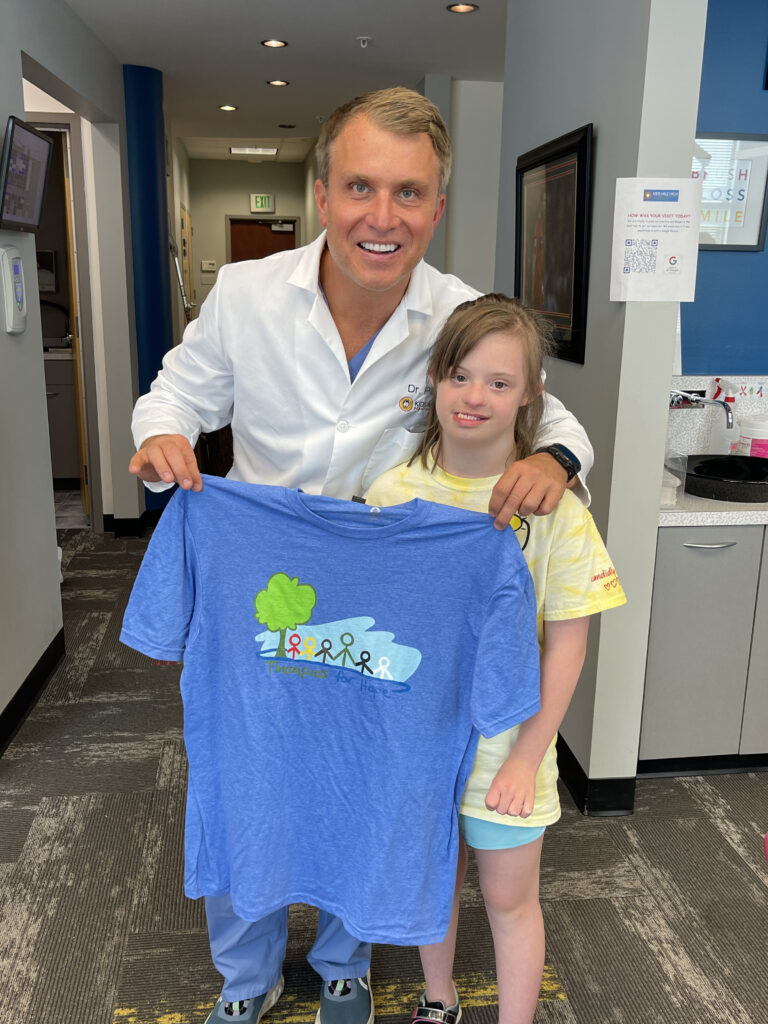 If you have a child with special needs, you likely excel at finding the best care and support for them. But what about dental care? You may be wondering, “Should my child see a special needs dentist?”
If you have a child with special needs, you likely excel at finding the best care and support for them. But what about dental care? You may be wondering, “Should my child see a special needs dentist?”
We will cover the key aspects of special needs dentistry, including its importance and how to find the right dentist to maintain your child’s healthy and bright smile.
Table of Contents
What is Special Needs Dentistry?
Before we discuss who should see a special needs dentist, let’s define what special needs dentistry is. This specialized branch of dental care focuses on providing personalized and compassionate care to patients with a wide range of physical, developmental, or cognitive disabilities. This includes children with conditions such as autism, Down syndrome, cerebral palsy, ADHD, and other unique challenges.
Special needs dentists are trained to understand the unique dental challenges that individuals with special needs may face. They create a safe and supportive environment, making dental visits positive for both the child and their family.
Why is Special Needs Dentistry Important?
You may wonder why your child should see a special needs dentist instead of a general dentist. The answer lies in the specialized care they provide. Children with special needs often have specific dental health issues that require a different approach.
- Tailored Communication and Approach: Special needs dentists are trained to communicate effectively with children who may have difficulty understanding or expressing themselves. They use techniques adapted to each child’s level of understanding, making dental visits less stressful and more enjoyable.
- Customized Treatment Plans: Every child is unique, and so are their dental needs. Special needs dentists develop individualized treatment plans considering each child’s medical history, sensory sensitivities, and behavioral needs. This personalized approach ensures your child receives the best care possible.
- Behavior Management Techniques: Special needs dentists are skilled in various behavior management techniques, from positive reinforcement to sedation options. These techniques help your child feel safe and comfortable during treatment, making the dental experience a positive one.
- Specialized Equipment and Facilities: Dental offices for special needs dentistry often have equipment and spaces designed for children with physical disabilities or sensory sensitivities. This can include wheelchair-accessible rooms, sensory-friendly environments, and tools to make the dental visit more comfortable.”
Who Should See a Special Needs Dentist?
Now that we’ve discussed why special needs dentistry is important, let’s consider who can benefit from seeing a special needs dentist. If your child has any of the following conditions or challenges, a special needs dentist may be the best choice:
- Children with Autism Spectrum Disorder (ASD) may be sensitive to sights, sounds, and smells in a dental office. This sensitivity can lead to feelings of being overwhelmed. Special needs dentists understand these challenges and create a calm, structured environment to reduce anxiety.
- Down Syndrome: Children with Down syndrome may have special dental needs, like delayed tooth growth, smaller or misshapen teeth, and a higher risk of gum disease. Special needs dentists are familiar with these issues and can provide the specialized care needed.
- Cerebral Palsy: Children with cerebral palsy may face challenges with oral motor function, leading to difficulties in brushing and flossing effectively. A special needs dentist can offer techniques and tools to assist with oral hygiene and prevent dental problems.
- Attention-Deficit/Hyperactivity Disorder (ADHD): For children with ADHD, sitting still for extended periods can be challenging. Special needs dentists use strategies to keep appointments short, engaging, and positive.
- Sensory Processing Disorders: Children with sensory processing disorders may be hypersensitive to light, sound, or touch. Special needs dentists adjust the environment and their techniques to accommodate these sensitivities.
- Genetic Disorders: Various genetic disorders, such as fragile X syndrome or Rett syndrome, can impact oral health and the ability to cooperate during dental care. Special needs dentists are trained to manage these challenges effectively.
- Physical Disabilities: Children with physical disabilities may require special accommodations for dental care, such as wheelchair access or modified dental equipment. Special needs dentists provide the necessary support to ensure every child receives the care they need.
How to Find the Right Dentist
 Finding the right dentist for your child’s unique needs is crucial. Here’s how you can find the perfect match:
Finding the right dentist for your child’s unique needs is crucial. Here’s how you can find the perfect match:
- Ask for Recommendations: Talk to other parents, your pediatrician, or your child’s therapist for recommendations on experienced special needs dentists.
- Research Online: Use online resources to find special needs dentists in your area. Websites like the American Academy of Pediatric Dentistry (AAPD) and the Special Care Dentistry Association (SCDA) offer directories to help you find qualified professionals.
- Visit the Office: Before scheduling an appointment, visit the dental office to see if it’s a good fit. Check if the environment is welcoming, accessible, and designed to accommodate children with special needs.
- Ask Questions: Don’t hesitate to ask about the dentist’s experience with special needs children, their approach to behavior management, and the types of accommodations they provide.
Preparing Your Child for a Dental Visit
Preparing your child for a dental visit can help make the experience smoother. Here are some tips:
- Social Stories: Create a social story about visiting the dentist. Include pictures and simple language to explain what will happen during the visit.
- Practice Visits: Schedule a practice visit to the dentist’s office. This can help your child become familiar with the environment without any actual treatment.
- Use Visual Aids: Use pictures, videos, or books about going to the dentist to help your child understand the process.
- Positive Reinforcement: Offer praise, stickers, or a small reward after the dental visit to reinforce positive behavior.
Conclusion
Special needs dentistry goes beyond mere dental treatment; it involves establishing a caring, empathetic, and secure setting for children facing distinct difficulties. Whether your child is diagnosed with autism, ADHD, physical impairments, or other special needs, a pediatric dentist specializing in special needs can offer the customized attention they deserve.
Finding the right dentist may take time, but it’s a journey that leads to happier dental visits and healthier smiles. If you think your child could benefit from seeing a special needs dentist, don’t hesitate to reach out. We’re here to help make every smile a little brighter.
If you have any questions or need to schedule an appointment, feel free to contact us at KidSmile High Pediatric Dentistry, your trusted pediatric dentist in Denver. We’re dedicated to providing compassionate, specialized care for all our patients.



